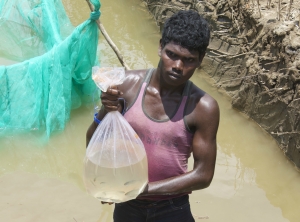Farmed fish: a nature based solution for increased resilience
Location: Andhra Pradesh, India. 4th Oct 2016

Yenadi tribe members hold up the products of their integrated fish farming ponds (c) IUCN/PPSS
A nature-based solution
IMFFS ponds, stocked with fish and crabs, are engineered to leverage the tides and surrounding mangroves. Incoming tidal water refreshes the ponds and brings in supplementary food for the farmed fish and crabs. This eliminates the need for artificial pumping of the pond water, and the need for synthetic feed. IMFFS ponds are thereby energy-efficient and organic. The system does not compromise on quality and size of produce; both of which are comparable to wild catch.
Mangroves are planted along the periphery and bunds within the ponds, providing additional nutrients in the form of leaf litter. Mangrove-associated marsh grass can also be cultivated as organic feed. Other associated species can be grown and sold as ornamental plants to supplement income. IUCN and MSSRF are further exploring the carbon sequestration and storage potential of the mangroves grown around the ponds.
Increased community resilience
In 2012, IUCN worked with MSSRF and Praja Pragati Seva Sangham (PPSS) to build ponds for families of the Yenadi tribe in Sarlagondi village in Andhra Pradesh. The Yenadi families used to hunt rats for farmers in agricultural fields earning INR 5 per rat. They have no permanent housing, and extremely low food or income security, often turning to manual or agricultural labor in times of need.
Just 3 months after 10 IMFFS ponds were setup on land donated by the Revenue Department, Government of India, the community was able to sell intermediary harvests as and when they required money or food. In the mid-year harvest, 106 crabs were sold from 8 ponds drawing in an average price of USD 1,681. The end of year (integrated fish-crab) harvest was sold for USD 4,423. On average a single Yenadi family earned between USD 224 - 676 from their ponds within 4 months of building the ponds.
Communities can now directly sell harvests at nearby local markets when they need money instead of borrowing money from money lenders/middle men and building up unnecessary debt. There is a growing sense of financial security and empowerment amongst the families. Through capacity building in finance management families are working to build permanent housing and send their children to school.

Yendai tribe members sell produce from their fish farms at the local markets (c) IUCN/PPSS
Moving forward
Even as humanity continues to depend on the oceans for food and livelihoods, pressures from overfishing, climate change and ocean warming are leading to big changes for local communities. MFF SGF projects are a great example of how state governments, IGOs (IUCN), CBOs (PPS) and research institutions (MSSRF) can partner to provide sustainable coastal livelihoods to coastal communities in need.
MSSRF is already working through the Climate Adaptation Fund and Government of India to replicate IMFFS across India. The Aquaculture Authority of India is considering the IMFFS model for eco-labeling for its potential for carbon sequestration and sustainability. IUCN is continuing to build coastal community resilience by addressing pressures and threats to ocean biodiversity and community livelihoods through MFF and other initiatives.
The IUCN World Conservation Congress in Hawai’i in September 2016 focused on ocean-related challenges and solutions through more than 100 events, including the IMFSS projects.
For more information contact:
Ms. Nisha D’Souza
Small Grants Officer, MFF
IUCN India Country Office, New Delhi
T: +91 11 2625 7742 (ext. 206)
E: nisha.d’souza@iucn.org

Harvest from the integrated fish farming ponds , Sarlagondi village, AP © Nisha Maria D'Souza, 2015